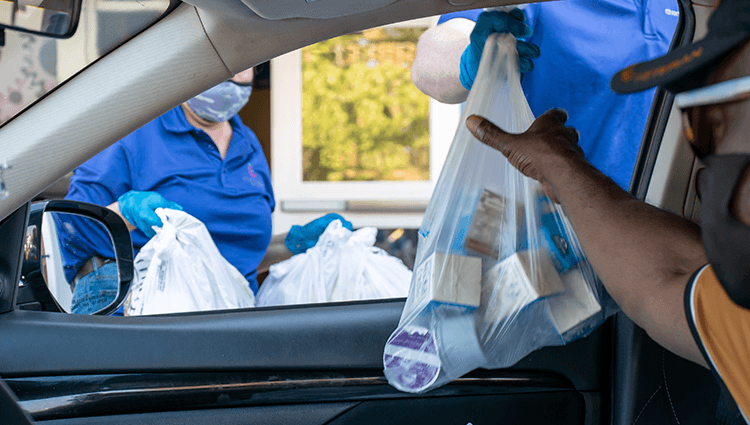When schools closed in early 2020 due to the pandemic, school nutrition departments were faced with some difficult challenges. Millions of children across the country depend on school meals, so knowing that pausing operations was not an option, nutrition departments worked swiftly to address uncertainty and logistical issues.
Like many other districts across the country, Klein ISD (Klein, Texas) paused in-person classes in mid-March for their 54,000 enrolled students.
“Klein ISD is committed to taking care of our students, and this has only been amplified during the pandemic,” said Doug Massey, director of Nutrition and Food Services. “We realized on our first day of curbside service, in early March, our community needed us more than ever before.”
The initial challenge was how to serve meals in a way that ensured the safety of staff, students and families. Like many districts, Massey and his team created a curbside meal program, offering easy pickup of meals at one time in a socially distant environment. Meals not only meet the requirements of a reimbursable meal, but also feature kid-friendly menu items and always include milk. Many schools are serving milk in bulk, too, by distributing half gallons or gallons instead of cartons to eliminate having to store multiple milk containers in a home refrigerator.
“Our menu features items we know students really enjoy,” Massey said. “Our curbside meals include popular items, like chicken nuggets, mac and cheese, buffalo bites, cereal, fresh fruit, French toast and pancakes, along with a choice between a gallon of chocolate or white milk.”
While the initial curbside program was met with a positive response by the local community, Massey’s team saw room for continued improvement. During the summer of 2020, they reevaluated their operational model and relaunched Klein Curbside as Klein2Go.
“Klein2Go is our solution for providing healthy meals to our Klein Online students,” said John Ceballos, marketing and training specialist for Klein ISD . “It’s a one-stop pickup for up to 14 meals at a time, which includes breakfast and lunch for every day of the week. It’s free for every child 18 and under who isn’t already receiving meals on campus.”
By December of 2020, Klein2Go had served over 2 million meals and seen as high as a 47% increase in participation over the 2019-2020 school year. All of this was achieved with 35-45% of their students learning virtually.
A large part of the program’s success was the development of a strong marketing program. Some of the team’s best marketing practices include:
- Targeted and Constant Communications – When parents pick up meals, they must show documentation of their student(s) being enrolled in Klein ISD or another school district. To make this easier, Ceballos sends a weekly email to parents with the documentation needed so they can simply pull that email up at the time of pickup. Reminders were shared on Klein ISD’s Facebook, Twitter and Instagram.
- Signage – Large banners advertising Klein2Go have been placed on major roads within the community to ensure awareness of the service and pickup times/locations.
- Family Surveys – Another important part of increasing participation has been offering families the chance to provide feedback via a parent survey and modifying the program based on the parent’s suggestions.
“We ask for feedback to make sure we are providing students with healthy options they actually want,” Ceballos said. “For example, when we began offering gallons of milk, initially we only offered white milk. Parents shared with us that their children loved the chocolate milk, and they wanted to see it back on the menu. We shifted our operations to quickly offer chocolate milk again.”
Despite uncertainty surrounding the evolving pandemic, successes from districts like Klein ISD provide communities with some much-needed certainty – the knowledge that despite difficult circumstances, school nutrition departments will continue to feed students well.




